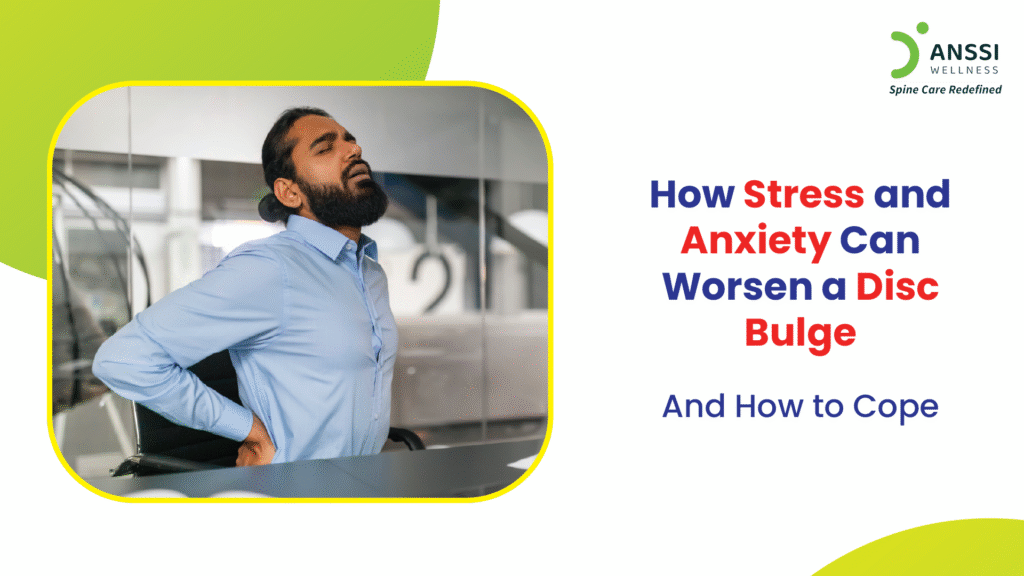Back pain is often seen as a purely physical condition, but in reality, it is a complex problem influenced by both the body and the mind. One common cause of back pain is a disc bulge, a condition where the soft cushion between spinal vertebrae bulges out of its normal position.
While lifting heavy objects, poor posture, or injury are well-known causes, many people overlook the significant role that stress and anxiety play in worsening disc bulge symptoms. Understanding this connection can help patients take a more holistic approach to healing.
What is a Disc Bulge?
A disc bulge happens when one of the spinal discs begins to protrude outwards. Unlike a herniated disc, where the disc material leaks out, a bulge is a milder form but can still cause significant pain.
Symptoms often include:
- Persistent lower back pain
- Radiating pain into the legs (sciatica)
- Numbness or tingling in the extremities
- Difficulty bending, sitting, or walking for long periods
While physical strain is a direct contributor, the emotional state of the body also plays a key role in how severe the symptoms feel.
The Hidden Connection: Stress, Anxiety, and Disc Bulge
Stress and anxiety impact the body more than many realise. When the mind is under pressure, the body responds with tension and inflammation, both of which can worsen spinal conditions.
Here’s how:
- Muscle Tension and Spinal Pressure: Stress makes muscles tighten, particularly in the neck, shoulders, and lower back. This constant tension places more pressure on already weakened spinal discs, aggravating the bulge and increasing pain.
- Increased Pain Sensitivity: Anxiety alters the brain’s pain perception. A mild discomfort that might normally be tolerable can feel much worse when stress levels are high. Essentially, the mind amplifies the pain signals.
- Poor Lifestyle Choices Under Stress: Chronic stress often leads to habits such as poor posture, reduced exercise, overeating, or smoking. Each of these can worsen spinal health and slow down disc bulge recovery.
How Stress Slows Down Healing
It’s not just about making pain feel worse; stress also interferes with the body’s natural healing process.
- Cortisol and Inflammation: Stress triggers the release of cortisol, the “stress hormone.” While helpful in small amounts, prolonged high cortisol levels increase inflammation and weaken tissue repair, slowing down spinal recovery.
- Sleep Disturbances: Stress and anxiety often disrupt sleep. Deep sleep is essential for tissue healing, spinal decompression, and reducing inflammation. The body finds it difficult to heal itself when it doesn’t get enough sleep.
- Reduced Commitment to Treatment: A stressed or anxious patient may neglect exercise routines, physiotherapy, or even medical appointments. This inconsistency can prolong recovery and make symptoms worse over time.
Coping Strategies: Restoring Balance to Mind and Spine
The good news is that managing stress can significantly improve disc bulge outcomes. A combination of mental wellness practices and physical care can help reduce pain and restore mobility.
1. Stress Management Techniques
- Deep Breathing and Meditation: Helps relax the nervous system and reduce muscle tension.
- Mindfulness Practices: Staying present can lower anxiety levels and improve overall well-being.
- Yoga and Tai Chi: Performing gentle movements that combine physical exercise with mental relaxation.
2. Physical Care for the Spine
- Posture Correction: Maintaining proper alignment while sitting, standing, or working prevents extra strain on the spine.
- Gentle Stretching and Strengthening: Exercises prescribed by physiotherapists can stabilise the spine and reduce disc pressure.
- Regular Movement: Avoid long periods of sitting; short walks or light stretches help circulation and relieve stiffness.
3. Professional Help for Mental Health
If anxiety and stress feel overwhelming, seeking counseling or therapy can be life-changing. Addressing emotional health not only improves mood but also reduces physical pain perception.
4. Non-Surgical Treatments for Lasting Relief
For those with persistent pain, non-surgical spinal decompression treatment offers an effective solution. This advanced treatment gently stretches the spine, reducing disc pressure and improving nutrient flow to aid healing. Unlike surgery, it is non-invasive, drug-free, and has minimal risks. Many patients experience significant pain relief and improved mobility through this treatment.
About ANSSI:
ANSSI Wellness focuses on improving the quality of life for patients suffering from spinal issues, aiming to provide relief where other conventional treatments have failed. Through advanced Non-Surgical Spinal Decompression Treatment, ANSSI is committed to helping patients avoid surgery and recover in a safe, effective, and compassionate environment.
Connect with ANSSI Wellness on LinkedIn, Instagram, and Facebook for expert guidance.




